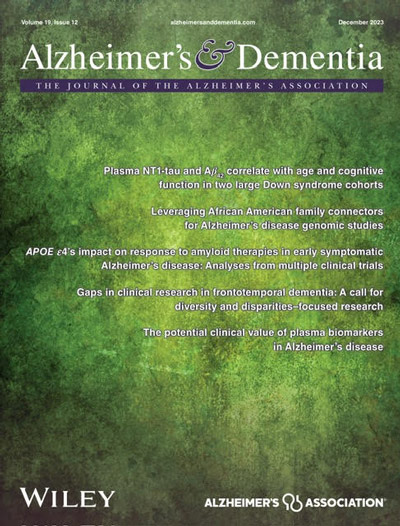Generational effects in Down syndrome: Enriched environment enhances functionality without reducing Alzheimer's disease risk.
IF 11.1
1区 医学
Q1 CLINICAL NEUROLOGY
引用次数: 0
Abstract
INTRODUCTION Down syndrome (DS) is the leading cause of intellectual disability (ID) and a genetic form of Alzheimer's disease (AD). We wanted to assess whether generational changes have induced (1) milder ID with greater independence and (2) delayed AD diagnosis. METHODS We analyzed 681 asymptomatic DS to test generational effects on ID, functionality, and cognition. In 353 DS individuals with AD, we compared clinical diagnosis age by ID using analysis of variance. In addition, dementia diagnosis age was examined through a published meta-analysis. RESULTS Our results indicate a generational shift toward a higher proportion of individuals with mild/moderate ID, greater intelligence, and autonomy. However, it was not paralleled by an ID-related delay in the age at AD onset in our cohort, or by generational delays reported over the past 35 years. DISCUSSION The findings highlight notable generational improvements in DS, but no effects on the age at AD dementia diagnosis. HIGHLIGHTS A generational effect has reduced the severity of intellectual disability in Down syndrome (DS). Individuals with DS have increased autonomy and improved intellectual milestones. The enriched environment has not delayed the age at Alzheimer's disease (AD) dementia in DS. Further studies should confirm if cognitive reserve might delay AD in DS.唐氏综合症的代际效应:丰富的环境增强功能,但不降低阿尔茨海默病的风险。
唐氏综合症(DS)是导致智力残疾(ID)的主要原因,也是阿尔茨海默病(AD)的一种遗传形式。我们想评估代际变化是否诱发了(1)独立性更强的轻度ID和(2)延迟AD诊断。方法对681名无症状DS患者进行分析,以检测代际对ID、功能和认知的影响。在353例DS合并AD的个体中,我们通过方差分析比较了ID的临床诊断年龄。此外,通过发表的荟萃分析对痴呆诊断年龄进行了检查。结果我们的研究结果表明,随着年龄的增长,轻度/中度自我认知的个体比例越来越高,智力和自主性也越来越高。然而,在我们的队列中,这与AD发病年龄的id相关延迟或过去35年报告的代际延迟并不一致。讨论:研究结果强调了退行性痴呆的显著代际改善,但对AD痴呆诊断年龄没有影响。HIGHLIGHTSA世代效应降低了唐氏综合症(DS)中智力残疾的严重程度。患有退行性痴呆的人自主性增强,智力水平也有所提高。丰富的环境并没有延迟退行性痴呆患者阿尔茨海默病(AD)痴呆的年龄。进一步的研究应该证实认知储备是否可能延缓退行性痴呆。
本文章由计算机程序翻译,如有差异,请以英文原文为准。
求助全文
约1分钟内获得全文
求助全文
来源期刊

Alzheimer's & Dementia
医学-临床神经学
CiteScore
14.50
自引率
5.00%
发文量
299
审稿时长
3 months
期刊介绍:
Alzheimer's & Dementia is a peer-reviewed journal that aims to bridge knowledge gaps in dementia research by covering the entire spectrum, from basic science to clinical trials to social and behavioral investigations. It provides a platform for rapid communication of new findings and ideas, optimal translation of research into practical applications, increasing knowledge across diverse disciplines for early detection, diagnosis, and intervention, and identifying promising new research directions. In July 2008, Alzheimer's & Dementia was accepted for indexing by MEDLINE, recognizing its scientific merit and contribution to Alzheimer's research.
 求助内容:
求助内容: 应助结果提醒方式:
应助结果提醒方式:


